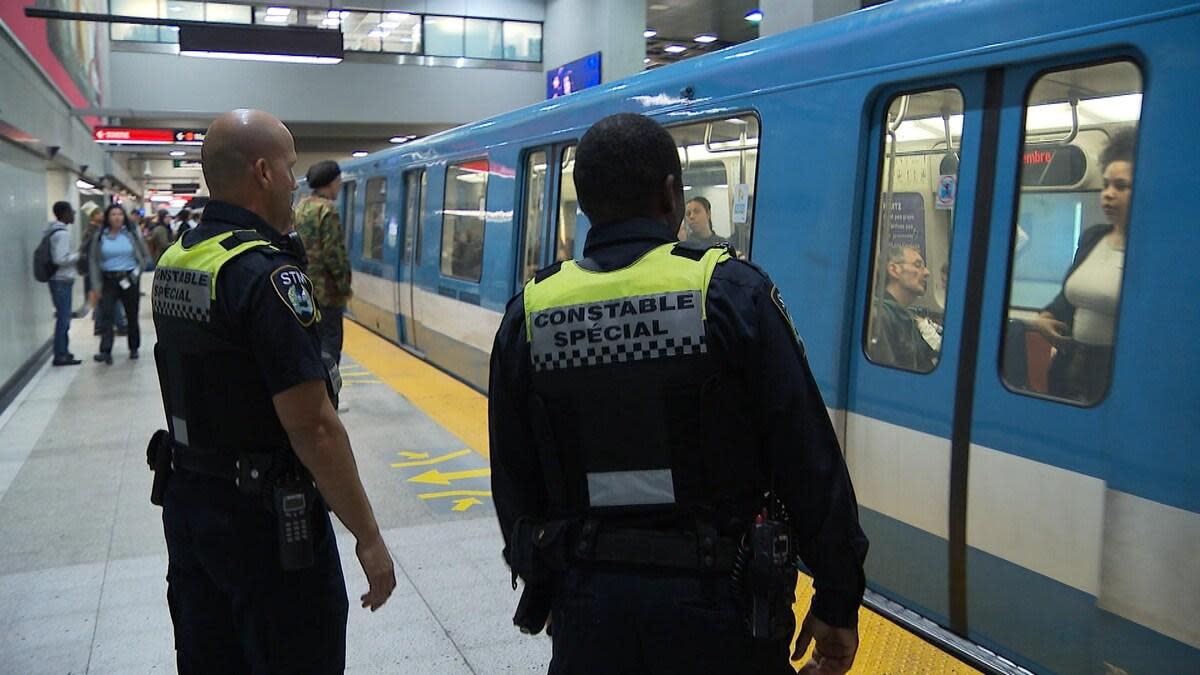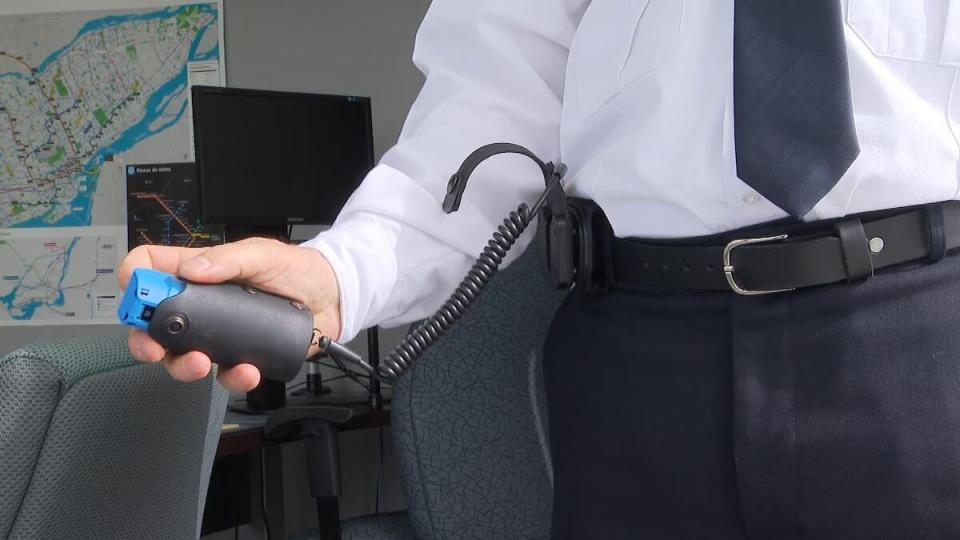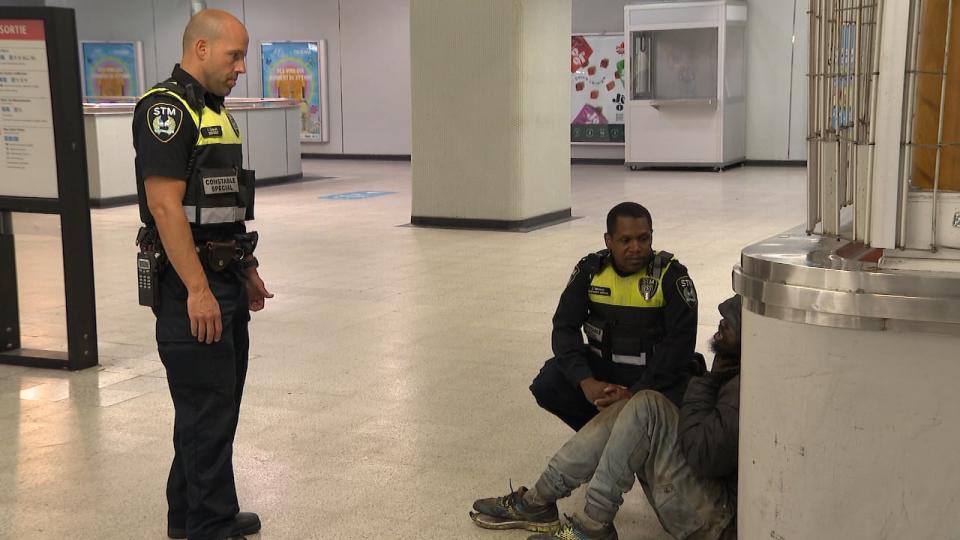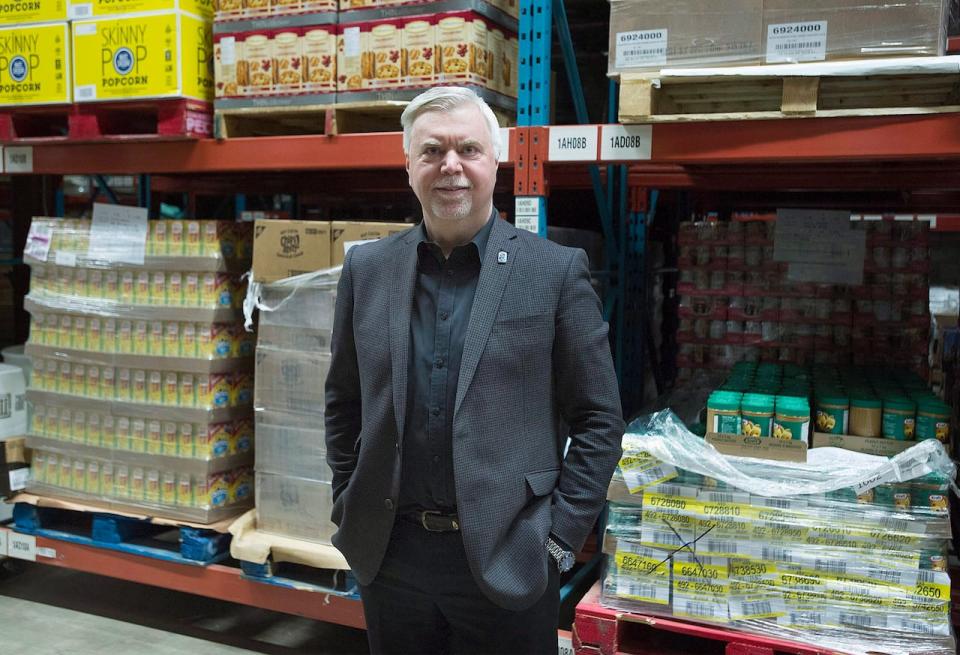Special constables in Montreal's Metro to be armed with cayenne pepper gel for 'last resort' interventions

The special constables who patrol Montreal's Metro stations will soon be armed with a new weapon to be used in what the city's transit authority calls "exceptional circumstances": cayenne pepper gel — a thicker, more targeted alternative to pepper spray.
Although special constables are already armed with batons, the Société de transport de Montréal (STM) plans to authorize the use of the gel next Wednesday, sparking concern among social advocates who support the city's unhoused and vulnerable.
The constables, who were granted the power to arrest for criminal offences on public transit in 2021, will be able to spray the gel as a "last resort in cases where safety is at stake," the STM told CBC in a statement.
"This tool would discourage assaults and facilitate peaceful outcomes by acting as a deterrent," the statement read, adding that force is "necessary" in about two per cent of interventions carried out by special constables.
STM security director Jocelyn Latulippe describes pepper gel as a tool of "de-escalation," a tool that is less provocative, less aggressive than a baton and causes no injuries.

STM security director Jocelyn Latulippe describes the gel as 'less volatile, more targeted' than pepper spray. He also says that, unlike a baton, it leaves no physical injuries. (Kevin Archambault/Radio-Canada)
The gel is "less volatile and more targeted," useful for the enclosed spaces of the underground Metro, and it does not spread as easily to people in the surrounding area, Latulippe says.
He also says it's been a long time coming since the cayenne pepper gel has been used for several decades by public transport constables elsewhere, including in Quebec City.
"That's where we are. It's a natural evolution," he said.

According to the STM, the number of interventions carried out by special constables has steadily increased over the past five years, with 42,008 interventions last year, 322 of which required the use of force. (Kevin Archambault/Radio-Canada)
According to the STM, the number of interventions carried out by special constables has steadily increased over the past five years, with 42,008 interventions last year, 322 of which required the use of force, including nine cases where a baton was used. In 2021, 35,722 interventions were carried out while the number hovers above 20,100 in 2018.
The city of Montreal told CBC it wants users and employees of the transit network to feel safe. "The social context has evolved in the metropolis, and our transport company must also adapt," a spokesperson for the city said in a statement.
Center for Research-Action on Race Relations (CRARR) executive director Fo Niemi says he wants to know why pepper gel is needed and how special constables will be trained. (Rowan Kennedy/CBC)
Justified force?
However, as the number of people experiencing homelessness in Quebec surges — nearly doubling from 2018 to 2022 — some social advocates are asking why a new weapon is needed and what impact it will have on the unhoused taking shelter in Metro stations, many of whom struggle with addiction and mental health issues.
Fo Niemi, executive director of the Center for Research-Action on Race Relations, says he too worries about the level of violence and incidents occurring in the transit network. Special constables, he says, sometimes need to use force to protect the public and may have good reason to want a new weapon, but he has some questions he wants answered first.
Above all, he wants to know what qualifies as a justification for a "last resort" decision to use the gel.
"We have to look at the nature of the interventions and why this kind of pepper gel will be required, how it's going to be used, and more importantly, whether the special constables will be adequately trained in order to respond to all kinds of situations without having to resort to either a baton or pepper gel," said Niemi.
The STM says special constables will be required to complete 10 hours of training, which includes considerations of risk for the person sprayed.

Sam Watts, CEO of the Welcome Hall Mission, says the long-term solution to the problem doesn't require weapons but access to housing. (Graham Hughes/The Canadian Press)
For Sam Watts, CEO of the Welcome Hall Mission, pepper gel — or any other weapon — misses the mark entirely as a proposed solution to the symptom of a larger social problem.
The use of pepper gel will deepen an "us and them '' rift between special constables and vulnerable people, says Watts, and it is incapable of addressing the problem that is causing unhoused people to seek shelter in the transit network in the first place.
"The problem isn't that we need to arm officers better. The problem is that we actually need to address the challenge we're facing, that homelessness is growing," he said.
"When you help people find housing, you're going to have fewer people in the Metro and you're going to have fewer problems."


